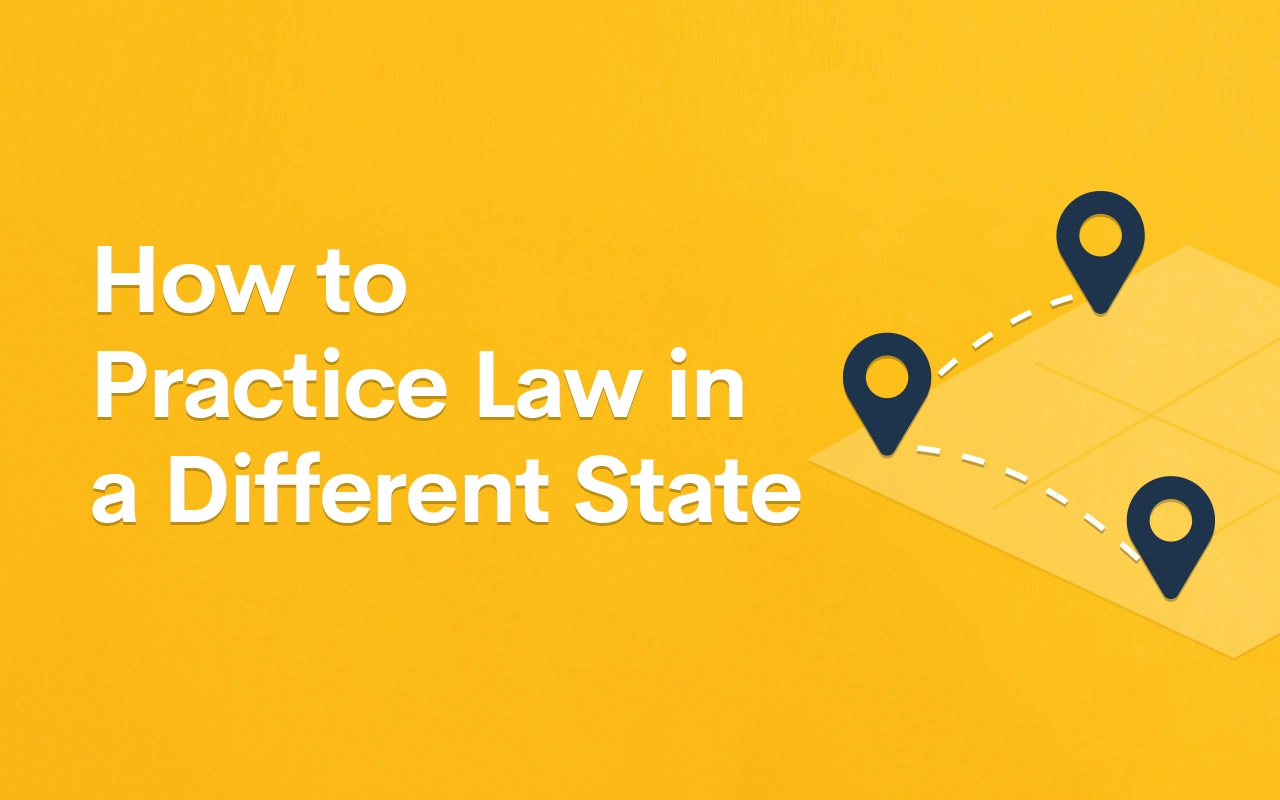How to Practice Law in a Different State

There are plenty of benefits to being a multi-state lawyer. Besides the most obvious advantage which is expanding your client base, it can also be practical when you live near a border between two different states. So, if you find yourself asking how to practice law in multiple states, you’re certainly not the first.
In this article, we’ll detail how to become a multijurisdictional lawyer as well as some of the perks and drawbacks involved.
The benefits of practicing law in two or more states
Greater client base
It’s understandably appealing to be able to take on clients in different states. It’s economically advantageous to generate more business in multiple locations. Not to mention one state may have more demand for a certain practice area than another which can be practical for tapping into your niche market.
Furthermore, you may have clients that need representation in different states who don’t want to have to hire multiple lawyers. Being able to offer all-in-one legal services can give you an edge over the competition. Of course, it goes without saying that you’ll need to allocate a bigger law firm marketing budget to market in not just one but multiple states. Or, just be more savvy with marketing strategies, such as familiarizing yourself with email marketing for law firms.
Greater flexibility
Life events can spring up suddenly, forcing lawyers to relocate to a different state. Some states may only offer bar exams as little as twice a year, and as such, it can cause a significant delay before being able to accept clients. For many lawyers, anticipating the possibility of relocation without the worry of having to lose a second of work is an important advantage. So, ensuring they can practice anywhere is a nice added security to their business.
Ethical responsibilities of practicing law in multiple states
As more and more lawyers are working remotely since the onset of COVID, many are accepting clients in other states. Unfortunately, in many cases, these lawyers are violating the rules.
Rule 5.5 of the American Bar Association Model Rules of Professional Conduct states that lawyers may not practice in jurisdictions where they are not admitted. The consequences of violating these rules can range from a fine to disbarment depending on the gravity of the violation. That being said, there are some exceptions to this rule.
For example, a licensed attorney may provide legal services temporarily in a different jurisdiction as long as they are associated with a lawyer who is admitted in that state.
How to practice law in multiple states
Check for states that offer reciprocity
Some states offer reciprocity if you meet certain conditions. Usually, these conditions depend on the amount of time you’ve been practicing and they may consider you eligible to practice in their state depending on the state bar that you’ve already passed.
It’s important to note, however, that you should never assume that just because a state offers reciprocity, you’ll be qualified. It’s always important to contact the reciprocity state bar to ensure you are up to date with the latest policies otherwise you could risk serious disciplinary consequences.
Take the uniform bar
You might need to brush up on your legal education to retake the Uniform Bar Exam. The Uniform Bar exam, also known as UBE, is a version of the bar exam that lets you practice between states with greater ease. It’s important to note, however, that each state has its own bar admission requirements for the examination, and the passing score may vary by state. So, although it can be a solution in some scenarios, it’s not a sure thing. This is certainly more convenient than taking New York State, North Carolina, or any other state's bar exam each time.
Take the bar exam for the states you want to work in
The most practical way to practice in another state is to pass the bar for that state. However, there are significant costs and challenges involved which may not be ideal for everyone, and taking the UBE or opting for a state that offers reciprocity is much more common.
Take on federal court cases
In theory, if you’re allowed to practice law in any state then you should be able to do so out of state. Yet, there is still some debate around this topic, and it’s still possible to find yourself in hot water with the state bar if you take this route.
Is getting licensed in multiple states right for you?
In the big picture, it’s much more convenient to practice in one jurisdiction for your entire career. Yet, lawyers looking to take their practice to the next level may choose to pursue the route of becoming a multi-state lawyer despite the challenges.
The good news is that thanks to advancements like the UBE and reciprocity laws (as well as advancements in law firm technology), practicing law in another state is much easier than it was 20 years ago. Deciding whether to get licensed in multiple states will come down to your unique circumstances and above all, how much time you have on your hands.
Getting licensed out of state requires a time commitment and administrative pile-up that may be difficult depending on your firm’s current workload. Putting in the work it takes to acquire additional state licenses will be much easier if your practice is streamlined with the help of modern legal technology like a CRM and client intake software. Not only can you access your firm from wherever you are thanks to cloud technology, but automation can help you stay on top of your most important tasks, and put your firm on autopilot while you’re focusing on passing the bar in another state.
Are you ready to see how Lawmatics all in one client intake, law firm CRM and marketing automation for lawyers platform can help you with a multijurisdictional career in law? Our CRM also provides law firm performance management features. Sign up for a free product demo today!
Sources Cited
Shari Davison, Reciprocity: What States Can You Practice Law?
https://www.onbalancesearch.com/reciprocity-what-states-can-you-practice-law/
Richard J. Rosensweig, Unauthorized Practice of Law: Rule 5.5 in the Age of COVID-19 and Beyond August 12, 2020
https://www.americanbar.org/groups/litigation/committees/ethics-professionalism/articles/2020/unauthorized-practice-of-law-rule-55-in-the-age-of-covid-19-and-beyond/


